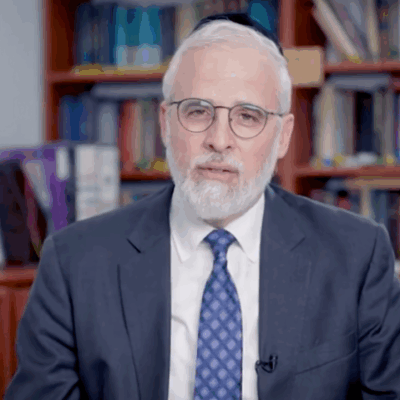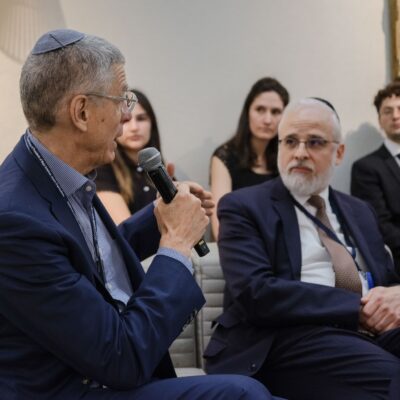Opinion
Choose your own adventure
A Jewish education marketplace for all
In Short
COVID accelerated our search for these answers, forcing us to become better acquainted with online educational approaches
While we have always known the power of technology, it took a pandemic for many of us to fully realize the power that technology could have. During these last 18 months, a great deal of communal commitment and creativity resulted in myriad new ways to virtually connect to Jewish life.
Mid-pandemic, in May of 2021, Pew released its most recent study on the Jewish community. It once again highlighted that how people Jewishly identify is different than in previous generations, devoting the first five chapters of the report speaking to identity and affiliation. Reflecting on this research, we as communal leaders must acknowledge that Jewish identity is complex and the composition of the Jewish family is more complex than in the past. The proliferation of Jewish opportunities online amplifies and underscores Pew’s message: Today, people connect to Jewish life, belief and practice in different ways.

The Jewish Education Project
The Jewish Education Project has always sought to create meaningful Jewish learning experiences that transform the lives of young Jews and their families. And so, putting these two big ideas together—ubiquitous use of technology and the changing nature of Jewish community—it is both timely and necessary that we are launching Truvie, our online Jewish learning platform, to reach as many of today’s Jews through the medium that they are so familiar with.
When we look at the shape and structure of how, where, and when Jewish education happens, it does not look so different than when I was a child in the 1970s/80s. If you want any sort of “formal” Jewish education you can, generally, choose from a day school or a Hebrew school, the vast majority of which are associated with congregations. For many children and families this model not only works but helps learners thrive within a life-long supportive community.
But this does not work for everyone. We know from a study conducted by the Steinhardt Foundation that only 50% of Jewish youth are engaged in religious school or day school[1]. Simply, this statistic means we are not offering educational experiences that speak to the needs and realities of all members of our community.
How can we shape a community and offer Jewish educational opportunities that engage and inspire Jews with diverse identities? How can we become comfortable with the idea that we can, we must, encourage connection and Jewish education in the ways we have for decades and in ways that are new and relevant to those who do not feel reflected in our current landscape? How do we foster numerous doorways (and windows) as gateways to Jewish education and engagement?
COVID accelerated our search for these answers, forcing us to become better acquainted with online educational approaches. As part of this learning, we spent the last year exploring various educational marketplaces such as Outschool, Kahn Academy, and Masterclass. While each provides something different, each is also designed around a shared value: the consumer will choose what works for them. We wondered if we could design a Jewish educational marketplace that similarly supported the level of choice, convenience, and flexibility embedded within these platforms. We also considered how to do this in the context of Jewish education so the resulting marketplace supported pluralism, excellence, and diversity. We learned that online engagement does not mirror the qualities of in-person educational experiences, but that online learning can provide meaningful, creative and engaging educational experiences.
So, we set out to develop a Jewish educational marketplace that makes it easy for families to “choose their own adventure.” The result of this work and experimentation is Truvie (a play on Lucky Find in French.) Launching with a three-month beta period on October 18, and an initial focus on 3rd – 8th graders, this new learning marketplace will allow both individual educators and organizations to offer short (aka learners register for a series of weeks rather than for a full school year or semester) synchronous courses. Teachers will have the freedom to create the courses and content they wish to teach, at the time they wish to teach it, at the price point they suggest. Parents will be empowered to chart their child’s unique Jewish journeys, encompassing the full spectrum of their vibrant and varied interests. For children and families with unique passions and pursuits, Truvie will (following the beta period) allow learners to engage in continuous learning while pursuing their passions (think specialty camping year-round.) Truvie will live at the intersection of identity and innovation, providing content-rich, hands-on experiences infused with Jewish spirit and culture from accomplished educators. Truvie will allow for Jewish learning—and Jewish teaching—from a kitchen table, a family room, from Portland, Dallas, and Topeka. Wherever there’s Wifi in North America (for now) Truvie will be accessible.
Through the ideation and development process, we recognized that Truvie can be an open marketplace…and a valuable tool to organizations seeking to offer their community additional or different virtual content. (The site will allow for private, co-branded spaces accessible only to organizational community members.) So Truvie will also offer a unique set of features for camps, congregations, JCC’s and others that seek to leverage the technology and the open marketplace.
At the heart of Jewish education is joy and the belief that Judaism – however you connect with it and identify—enhances your life, helps you be a better person, and enriches your understanding of the world. As we emerge from the joyous month of Tishrei, what better way to renew our commitment to Jewish life, history, peoplehood, practice, culture…. than to foster new means for our youth to discover the beauty and joy of Jewish life.
Susan Wachsstock is chief program officer at The Jewish Education Project. Truvie is partially funded by the Jewish Community Response and Impact Fund (JCRIF).
[1] These numbers were derived from a statistical analysis of the landscape conducted 4 years ago by the Steinhardt Foundation. Based on communal studies it was estimated that there were approximately 85,000 students in each cohort, 68,891 who are non-Orthodox. Based on enrolment in 6th grade at the time 26,334 of these non-Orthodox youth were engaged in supplementary schools (38.2%), 2,509 in day schools (3.6%) and 39,281 (58.1%) engaged in neither form of formal education.

 Add EJP on Google
Add EJP on Google







